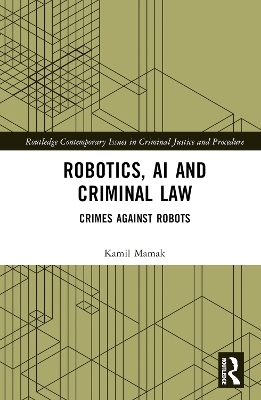
Robotics, AI and Criminal Law
Crimes Against Robots
Seiten
2023
Routledge (Verlag)
978-1-032-36279-3 (ISBN)
Routledge (Verlag)
978-1-032-36279-3 (ISBN)
This book offers a phenomenological perspective on the criminal law debate on robots. Today, robots are protected in some form by criminal law. This book presents the different rationale for protecting robots beyond the property justification based on the phenomenology of human-robot interactions.
This book offers a phenomenological perspective on the criminal law debate on robots. Today, robots are protected in some form by criminal law. A robot is a person’s property and is protected as property. This book presents the different rationale for protecting robots beyond the property justification based on the phenomenology of human-robot interactions. By focusing on robots that have bodies and act in the physical world in social contexts, the work provides an assessment of the issues that emerge from human interaction with robots, going beyond perspectives focused solely on artificial intelligence (AI). Here, a phenomenological approach does not replace ontological concerns, but complements them. The book addresses the following key areas: Regulation of robots and AI; Ethics of AI and robotics; and philosophy of criminal law.
It will be of interest to researchers and academics working in the areas of Criminal Law, Technology and Law and Legal Philosophy.
This book offers a phenomenological perspective on the criminal law debate on robots. Today, robots are protected in some form by criminal law. A robot is a person’s property and is protected as property. This book presents the different rationale for protecting robots beyond the property justification based on the phenomenology of human-robot interactions. By focusing on robots that have bodies and act in the physical world in social contexts, the work provides an assessment of the issues that emerge from human interaction with robots, going beyond perspectives focused solely on artificial intelligence (AI). Here, a phenomenological approach does not replace ontological concerns, but complements them. The book addresses the following key areas: Regulation of robots and AI; Ethics of AI and robotics; and philosophy of criminal law.
It will be of interest to researchers and academics working in the areas of Criminal Law, Technology and Law and Legal Philosophy.
Kamil Mamak is a philosopher and a lawyer. He is a postdoctoral researcher at the RADAR: Robophilosophy, AI ethics and Datafication research group at the University of Helsinki, Finland, and an assistant professor at the Department of Criminal Law at the Jagiellonian University, Poland. He is also a Member of the Board of the Cracow Institute of Criminal Law, Poland.
1. Introduction 2. The Moral Status of Robots 3. Robots as Humans 4. Mistreatment of Robots 5. Sex Robots 6. Relations with Robots 7. Robots, Artificial Intelligence, and Religions 8. Police Robots
| Erscheinungsdatum | 05.09.2023 |
|---|---|
| Reihe/Serie | Routledge Contemporary Issues in Criminal Justice and Procedure |
| Zusatzinfo | 1 Halftones, black and white; 1 Illustrations, black and white |
| Verlagsort | London |
| Sprache | englisch |
| Maße | 156 x 234 mm |
| Gewicht | 500 g |
| Themenwelt | Geisteswissenschaften ► Philosophie ► Philosophie der Neuzeit |
| Informatik ► Theorie / Studium ► Künstliche Intelligenz / Robotik | |
| Recht / Steuern ► Allgemeines / Lexika | |
| Recht / Steuern ► EU / Internationales Recht | |
| Recht / Steuern ► Strafrecht ► Kriminologie | |
| Recht / Steuern ► Strafrecht ► Strafverfahrensrecht | |
| ISBN-10 | 1-032-36279-0 / 1032362790 |
| ISBN-13 | 978-1-032-36279-3 / 9781032362793 |
| Zustand | Neuware |
| Informationen gemäß Produktsicherheitsverordnung (GPSR) | |
| Haben Sie eine Frage zum Produkt? |
Mehr entdecken
aus dem Bereich
aus dem Bereich
Buch | Softcover (2024)
REDLINE (Verlag)
20,00 €
Eine kurze Geschichte der Informationsnetzwerke von der Steinzeit bis …
Buch | Hardcover (2024)
Penguin (Verlag)
28,00 €
was sie kann & was uns erwartet
Buch | Softcover (2023)
C.H.Beck (Verlag)
18,00 €


